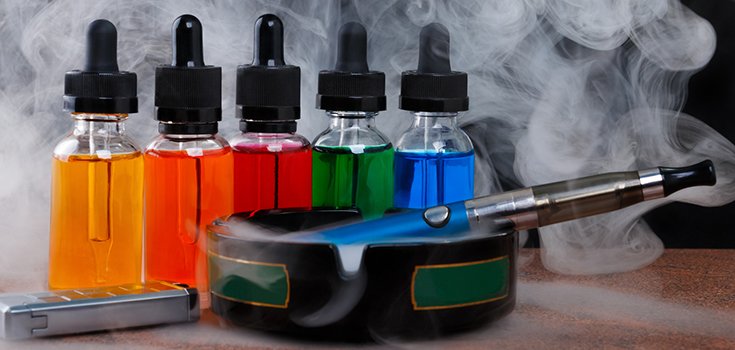Even Without Nicotine, E-Cigarette Flavorings may Damage Blood Vessels

If you’ve taken up vaping under the guise that it’s safer than smoking cigarettes, drop your e-cigarette. A study by researchers from Boston University School of Medicine shows the flavorings in e-cigarettes – sometimes called “e-juice” or simply “juice” – may directly harm the blood vessels. [1]
The researchers focused specifically on how chemical flavorings in e-cigarettes affect the body. They looked at 9 individual flavorings:
- Menthol (mint)
- Acetylpyridine (burnt flavor)
- Vanillin (vanilla)
- Cinnamaldehyde (cinnamon)
- Eugenol (clove)
- Diacetyl (butter)
- Dimethylpyrazine (strawberry)
- Isoamyl acetate (banana)
- Eucalyptol (spicy cooling)
The team isolated endothelial cells – the cells lining blood vessels in the heart – from smokers and non-smokers. Non-smokers’ cells showed increased inflammation when exposed to the flavorings. The chemicals also slowed the release of chemicals that promote blood flow, including nitric oxide. Both effects are signs of short-term toxicity, and those signs were also visible in the cells of the smokers.
In other words, the flavorings may damage blood vessels, even without nicotine.
Lead author Jessica L. Fetterman, an assistant professor of medicine at BUSM, said:
“Our findings show that flavoring additives themselves were directly toxic to blood vessels and have adverse effects that may have relevance to cardiovascular toxicity long-term similar to combustible cigarettes.”
Previous studies looked primarily at the effects of e-cigarettes themselves on blood vessels. Far less was known about the impact of e-cigarette flavorings on health. Every flavoring Fetterman and her colleagues studied decreased nitric oxide output.
Fetterman explained that the combination of less nitric oxide flowing through the blood vessels and the increased inflammation observed by the scientists “are some of the first changes to occur leading up to cardiovascular disease and events like heart attacks and stroke,” making them “early predictors of heart disease.”
All 9 chemicals caused cell death when tested at their highest levels. But cinnamon, clove, strawberry, banana and spicy cooling caused these precursors to heart disease at lower levels.
When researchers heated vanilla, clove, and mint to replicate how they are used in e-cigarettes, the vanilla and clove decreased nitric oxide flow, but not the mint flavoring.
One of the limitations of the study was that researchers didn’t heat all 9 flavorings.
Interestingly, many e-cigarette flavorings are considered safe to eat, but previous research suggests they may damage the lungs. [3]
Fetterman remarked:
“Our study suggests that the flavoring additives used in tobacco products like e-cigarettes, on their own or in the absence of the other combustion products or components, may cause cardiovascular injury. [That] could have serious implications, as flavored tobacco products are the most popularly used products, especially among youth.” [2]
She said that future studies are needed which look at the effects of flavoring additives in the body immediately after someone vapes. Her team is currently in the midst of conducting studies on vapers, so “hopefully we will be able to shed some more light on this topic soon.”
In June 2018, San Francisco voters approved a ban on flavored tobacco products, including menthol cigarettes and flavored vaping liquids. The move was fueled by the popularity of e-cigarettes and other vaping products among teens, who are attracted to the items’ array of colors and flavors, as well as by studies showing that menthol makes cigarettes more addictive.
Philadelphia attempted to enact a similar ban, but the plan came grinding to a halt when Pennsylvania legislators stripped the city of its power to pass additional tobacco regulations.
Sources:
[1] Medical Daily
[2] Gizmodo
[3] Reuters
